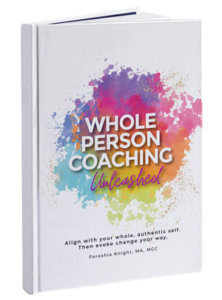Working with a coach may feel like working with a therapist. Much like a therapist, a coach really listens to you. They are both deeply present to you and your ideas, your struggles and your triumphs. They also hold a courageous space for you to explore the intricacies of your life and any changes you want to make within it.
It’s also worth noting that a number of the theoretical roots and foundations for the coaching professional are shared with a variety of counseling and therapeutic approaches. Positive Psychology is one example in which coaching and therapy align. It identifies the strengths and virtues that enable individuals and communities to thrive through applied sciences. Focused on an individual’s happiness, both systems are rooted together in their understanding of human nature and change.
But while a therapist is essential in combating clinically diagnosable problems associated with mental health, and may employ the core tools of coaching within treatment, their function and end goals are substantially different from that of a professional coach – not to mention their approach.
Here’s how.
First Difference: Clinical diagnosis (and medication)
A therapist works with the client to identify challenges through a diagnostic structure, typically based on the framework provided through the Diagnostic and Statistical Manual of Mental Disorders (DSM). Upon identifying the disorder, a therapist will attempt to alleviate symptoms through counseling and even prescription medications – the end goal being the desired behavior or result as defined by the therapist with the clients well-being in mind.
In contrast, a coach – and in particular a Whole Person Coach – does not rely on a pre-defined definition of normalcy. You’ll never be diagnosed, treated or offered prescriptions. Instead, she or he encourages you as the client to assess your life though your own lens, drawing upon your unique experience and abilities to achieve success. You’ll be inspired to figure things out for yourself and well-supported through a holistic and richly-collaborative process.
Coaching is a professional client relationship in which the coach facilitates the creation or development of your personal, professional or business goals and then supports you to develop and carry out a strategy for achieving those goals. As the client, you are fully responsible for your physical, mental and emotional well-being, including the choices and decisions you make throughout the coaching process. The coaching relationship does not involve the diagnosis or treatment of mental disorders as defined by the American Psychiatric Association. Nor is it a substitute for counseling, psychotherapy, psychoanalysis, mental health care or substance abuse treatment, and should not be used in place of any form of diagnosis, treatment or therapy.
The key difference is in the definition. A therapist tells you what’s wrong, as they recognize it, by digging into the roots of why things are the way they are – definitions established by averaging the experiences of others. But in a coaching relationship, YOU lead the way. Supported by the coach, you rediscover latent talents and gifts you may have long forgotten, each of which is then leveraged to help you move forward.
It seems rather straightforward. But just as no two individuals are the same, neither are the solutions to their stumbling blocks and success.
Second Difference: Your past vs. your future
A therapist attempts to heal pain, dysfunction, or deep and often irresolvable conflict within an individual or a relationship between two people or more. The primary goal in this scenario is to resolve difficulties from the past that are hampering an individual’s emotional functionality in the present, thereby improving overall psychological functioning.
This is where we find the other major difference between a coach and a therapist: focus. Coaching is about moving forward. In fact, it’s ALL about moving forward! It’s future-focused. When working with a coach you can expect a number of thought-provoking questions that invite you to think in new and improved ways as you work towards your desired outcome, now and for the rest of your life.
A coach focuses on the present moment as it relates to you creating your preferred future. Each and every session is directed by what you want to focus on and what you want to accomplish. Coaching is a goal-centric, action-oriented process that is based on your ability to learn, change and transform your life. In fact, it is through the transformational learning process that you get to where you really want to be and, in the end, how you become self-innovative.
What is “self-innovative?”
Self-innovation is one’s ability to naturally think in more powerful ways, almost as if you have your owner “Inner Coach” inside your mind. It’s a powerful voice that acts to create new ideas, fresh perspectives and alternative approaches. In fact, many clients have reported that, through coaching, their inner critic transformed into an inner coach. As a result, they have been able to replace their fear-based thinking and self-talk with optimism and a solutions-focused approach to their life.
Not all who stumble personally or professionally need the assistance of a therapist. Far from it, in fact. Rather, we have found that by accessing the innate wisdom within you and working toward clearly defined goals, you can right the course of your life or career and effectively move toward your desired outcome. And while your coach takes a hand in it (and often two, applauding you as you go!), ultimately it’s you as the client who builds your own life toolkit and gains skills that will serve you far beyond the coaching relationship.
Learn more about Whole Person Coaching or call us today at 1-888-660-5588 to find your personal behind-the-scenes life and/or business strategist.


